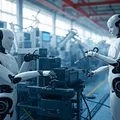Inside the Silicon Behemoth’s Quest to Rewrite the Rules of AI, Automation, and Our Future with Machines
If you thought Nvidia was content dominating the AI chip market, think again. Its upcoming Jetson Thor platform isn’t just another piece of hardware—it’s a bold, some might say audacious, move to corner the humanoid robotics space. While rivals tiptoe around the edges, Nvidia is effectively planting a flag and declaring: “We’re here to power the robots that will walk among us.”
And if that makes you uncomfortable, you’re not alone. The stakes couldn’t be higher: Humanoid robots may soon move from sci-fi curiosity to indispensable workforce collaborators, transforming industries from manufacturing to eldercare. Nvidia’s ambition? To ensure these bots run on its chips and its software, making the company indispensable in a trillion-dollar market.
Jetson Thor: The Engine Behind Tomorrow’s Humanoids
Set to launch in the first half of 2025, Jetson Thor is Nvidia’s latest shot at total market dominance. Forget conventional GPUs—this platform is laser-focused on robotic autonomy, intelligence, and near-human reflexes.
- High-Performance GPU Cores
Real-time vision, speech, and decision-making, all happening faster than you can blink. Yes, that’s the whole point: humanoids that can move, adapt, and blend in with human environments. - Sensor Fusion on Steroids
Today’s humanoids juggle cameras, LiDAR, and ultrasound like rookie acrobats. Jetson Thor aims to unite all this data with minimal latency, giving robots a seamless awareness of their surroundings. - Battery-Sipping Efficiency
A near-supercomputer in a robot that can walk around for hours without conking out. Good luck achieving that without Nvidia’s chip wizardry.
In short, Jetson Thor isn’t just a step forward—it’s a leap that Nvidia wants to turn into the default standard for any serious humanoid project on the planet.
Why Nvidia’s Strategy Is a Game-Changer
Unlike other tech Goliaths dabbling in robotics (looking at you, Google and Amazon), Nvidia isn’t building the bots itself. Instead, it’s positioning itself as the platform—the irreplacable hardware and software layer that every robotics company needs to succeed.
- Comprehensive Software & AI Training
Platforms like Isaac Sim and Project GR00T (launched in March 2024) give devs the tools to model, train, and refine robots before they ever see a production line. Why rely on clunky trial-and-error when you can simulate a million scenarios overnight? - Cross-Industry Collaborations
They aren’t just partnering with a handful of big names. Nvidia is forging ties everywhere—take Figure AI, which used Nvidia’s platform to power its Figure 02 humanoid.
More collaborations mean more industry penetration, meaning everyone ends up dependent on Nvidia’s ecosystem. - Rocket-Fueled Go-to-Market
Easier software stacks, validated hardware, robust simulation—Nvidia’s smoothing every wrinkle so manufacturers can pump out robots faster. That means hundreds, maybe thousands, of humanoid variants hitting the market in record time.
Translation: If you want to build a humanoid robot without Nvidia’s help, you’re probably betting on an uphill battle. That’s how you lock down an entire future market.
A $165 Billion—and Counting—Goldmine
Robotics is already an $78 billion industry, projected to hit $165 billion by 2029. And that’s not even counting the humanoid slice that could explode to the trillions by 2050. Industries from healthcare to hospitality are salivating at the idea of robots that can climb stairs and pick items off high shelves.
Humanoid robots—once a geeky fantasy—are now serious business. They’re flexible, adaptable, and can fit into human-shaped worlds without a total infrastructure overhaul. And Nvidia is swooping in to ensure these future machines all run on… you guessed it… Nvidia hardware.
The Big “So What?”: Society on the Brink of a Robot Takeover
All this unstoppable progress raises some prickly questions:
- Jobs, Jobs, Jobs
Millions of roles—from warehouse workers to restaurant staff—could be swallowed by robots that cost less over time, don’t need breaks, and don’t unionize. The future of work might look alarmingly automated. - Ethical Fiascos Ahead
When a humanoid damages property or injures someone, who’s liable? What about data privacy, or the looming specter of robots that learn behaviors we don’t want them to have? - Human-Robot Interaction
Nvidia brags about real-time sensor fusion and generative AI that’ll make robots feel more “natural.” But are we ready to share sidewalks and workplaces with machines that mimic human behavior—and might even outthink us in certain tasks?
These aren’t minor speed bumps. They’re the moral crossroads of the 21st century. And guess who’s writing the rulebook? Tech giants like Nvidia.
Recent Milestones: Nvidia’s Not Just Hyping—They’re Delivering
- Project GR00T (March 2024)
A universal AI “brain” for humanoids. Think generative AI + deep reinforcement learning for robots that can adapt to new tasks without a massive code overhaul. - Collaboration with Figure AI (August 2024)
Figure 02—a humanoid robot sporting Nvidia’s tech—has already wowed the market with advanced dexterity and real-time problem-solving. Imagine what’s next.
These aren’t random experiments; they’re strategic plays to make Nvidia synonymous with advanced robotics, just like it’s the default in AI chips today.
The 2025 Horizon—and Beyond
With Jetson Thor set to drop in mid-2025, Nvidia is basically declaring: “The age of humanoid robots isn’t coming. It’s here.” Armed with near-supercomputer performance and a platform approach that rivals Apple’s iOS ecosystem, Nvidia is poised to dominate a tech shift that could be as disruptive as the PC or smartphone revolutions—maybe bigger.
That upheaval is about more than cool gadgets. It’s about reshaping factories, hospitals, stores, even private homes. How we work, live, and engage with machines might look radically different by 2030. Nvidia’s forging the hardware and software to make it happen faster than most of us can grasp.
Bottom Line: Nvidia Wants to Be the Beating Heart of Humanoid Robotics
And let’s not kid ourselves: if Nvidia succeeds, it will hold a level of influence that’s both exhilarating and downright terrifying. After all, controlling the “brains” of a global robot workforce grants enormous power—economic, technological, and even political.
Will it spark a revolution in productivity, safety, and overall human advancement? Or will we watch entire sectors become obsolete as robots out-hustle humans in every conceivable way?
One thing’s for sure: Nvidia isn’t just shaping the conversation; it’s engineering the core technology that will propel humanoid robots from fringe fascination to everyday reality. The next era—whether utopian dream or dystopian nightmare—will likely run on Nvidia silicon.
What Do You Think?
Is Nvidia creating the golden key to a post-human-labor paradise, or are we sleepwalking into an era where machines outdo us in everything from manual labor to cognitive tasks? Drop your thoughts. Because ready or not, the Jetson Thor revolution is coming—and it might just change the world more than any of us can imagine.
Related: The Role of AI in Advancing Humanoid Robot Technology: A Detailed Look · The Future of Humanoid Robots: Innovation and Impact
Ready to buy? Browse humanoid robots for sale on Robozaps.









